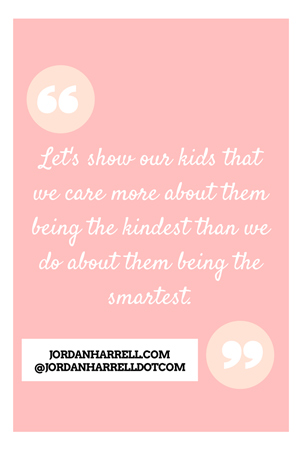I remember being alarmed at her early disinterest in learning... or at least what we think of as learning. My oldest had always loved to read, but early on, Hattie would slam the cover shut any time I even tried to crack a book. And the few times I attempted to teach her sign language as a baby, she would scream at me and yank her hands away, as if she was trying to tell me, I do not have time for silly things like this. There’s a whole world out there to explore.
While she can now engage long enough to complete a book or even a few (though she asks approximately 18,000 questions per page, some completely irrelevant), she’s still not interested in sitting down and working for long stretches.
Occasionally, against my better judgment, I get anxiety about the fact that she doesn’t know many letters or how to write her name or that she still gets that eleventeen-17 range jumbled when counting. I drive by the Montessori Preschools that I cant afford and think, “I should really work on preschool curriculum with Hattie so that she has a fighting chance...”
But then I think back to my education degree and remind myself that Hattie just turned THREE, and this pressure that has been created to have my kids literate by the age of 4 and performing long-division by 5 and composing symphonies by 6 WAS NOT created by teachers or child development researchers but by the pressures of a flawed system and competitive parents.
I remember one of my professors discussing the new environment into which we are sending our students. Our world is no longer an environment in which students who “know the most” will be the most successful. Information is now immediately accessible, so education is less about “knowing stuff” and more about creative thinking, application, cooperation, leadership skills, and all of that other intangible, “outside of the box” stuff.
Guess what!? These are things cultivated in free play, not rigorous preschool curriculum.

Then I think about my biblical duty as a momma: to make little, tiny Jesus impersonators. That changes things. Because Jesus is not remembered for his smarts but for his wisdom. He’s not remembered for his SAT score or for how many multisyllabic words he used in the Sermon on the Mount. He is remembered for his desperate pursuit of outcasts, his passionate cry for justice for the oppressed, and his counter-cultural inclusiveness — EVERYONE can be part of his club.
What if we taught our kids that while academics are important, because working hard at everything we do is important, school is not just a means to a good career but an incredibly convenient mission field? They have an awesome opportunity to desperately pursue outcasts, passionately cry out for justice for the oppressed, and be counter-culturally inclusive — make sure EVERYONE is a part of the club. They get to BE Jesus to the lost and lonely every single day. And if schools are anything like they were four years ago when I taught, there are PLENTY of lost and lonely.
When we push academic success at such an early age (or at any age), not only do our children lose valuable time to play and learn through osmosis, but we can unintentionally put SMART on a pedestal, high above KIND, SELFLESS, or COMPASSIONATE.
 Because what are our goals for our children?
Because what are our goals for our children?
In the long run, are we just dying for them to be rich and famous? To be the CEO of a company? Is financial success at the top of our priority list?
If not (or even if so), let’s just let our three-year-olds play. Let’s all just calm the heck down about kindergarten-readiness, because if you’re worried about your baby being ready, that’s a good sign that he will be ready. Instead, let’s make sure they know that sharing is JUST AS important as counting, cooperating is JUST AS important as phonics, that we care more about them being like Jesus than we do about them knowing a lot of stuff.
Let’s show our kids that we care more about them being the kindest than we do about them being the smartest.









Reader Comments
Archived Facebook Comments